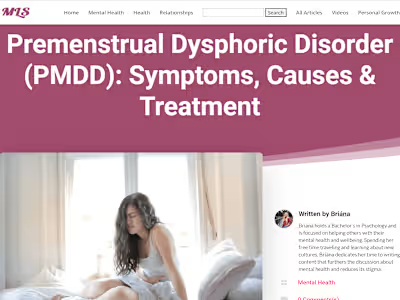Copywriting: Informative and Sourced Information for Website
Introduction: Obsessive Compulsive Disorder: Symptoms and Causes
Obsessive-compulsive disorder (OCD) is a mental health condition that can be devastating for those who experience it. But it’s also a pretty treatable disorder. Below, you’ll be able to find explanations of what OCD is and how to recognize its symptoms.
What are Obsessions?
Well, obsessions are unwanted and intrusive thoughts or ideas that seem impossible to stop or control.
These thoughts are not about something you’re worried might happen in the future, but rather about things that are happening right now. For example, if you have an obsessive thought about forgetting to lock the door before leaving home, it’s not that you’re worrying about what would happen if someone broke into your house because it may be unlocked; it’s more like you keep thinking about whether or not you actually did lock the door before leaving and doubting that you even did it.
Here are some common obsession types:
Cleanliness/Germs
Alignment/Organization
Intrusive Thoughts
Harm/Taboo Topics
Obsessions can be terrifying because they feel so real and uncontrollable—like they just keep playing on repeat in your mind and won’t go away until they’ve had their way (which can be a really unpleasant experience). Many people have found an increase in anxiety symptoms when they ignore their obsessions.
The study and research of OCD is rather intensive and researchers have spent years trying to understand these thoughts (obsessions) which often lead to compulsions.
What are Compulsions?
Compulsions are repetitive behaviors that a person feels driven to perform in response to an obsession.
These compulsions often create great distress and anxiety for those who experience them. Many people who suffer from compulsive behaviors know that they may spend an unreasonable amount of time completing the compulsion but feel they cannot help it. Even with the irrationality of the compulsion, the individual may feel that great harm will come to themselves or someone else if the behavior isn’t performed.
These compulsions may also serve the purpose of neutralizing the obsession. When the intrusive thoughts are relentless, oftentimes engaging in the behavior will help the thoughts go away. Although, this does seem to only be a short-term answer, because the thoughts will come back and the cycle may continue repeating itself.
Compulsive hand washing is a common example of a compulsion; it is repeated over and over again even though it might not seem logical, there is a strong sense of pressure to complete it. Another example is ‘checking.’ People may check multiple times to confirm they didn’t hurt someone else.
The most common compulsions include:
Checking (checking that you locked the door)
Counting (counting every time you blink)
Washing/cleaning (washing your hands three times before eating)
Symptoms of OCD:
Abnormal fears, such as fear of contamination or fear of harming oneself are common symptoms of OCD. Another common symptom is having to have things in a particular order or placed just right. Some people with OCD may spend a considerable amount of time making sure things are in an exact position, otherwise they may feel compelled to fix it.
Because the symptoms of OCD are so varied and can be easily mistaken for other conditions, they often go undiagnosed. People may also realize and acknowledge that their thoughts or behaviors are irrational but cannot stop them or they may see them as a normal part of their everyday life.
There are many symptoms/disorders that may coexist with OCD. It is important to consult with a primary care physician if you have questions or concerns.
Causes of OCD:
Many things can cause OCD, but it’s often a combination of factors. Unlike many mental health conditions, there are no clear causes for OCD.
Some research suggests that OCD may be genetic; if you have a family member who has been diagnosed with the disorder, then your risk is increased. There are also other possible physical causes of OCD—for example, changes in brain chemistry or trauma (including abuse) in childhood are linked to the development of the condition.
But it’s important to remember that these factors only increase your risk for developing obsessive-compulsive symptoms—they do not mean that you’ll definitely develop them. Other factors such as stress and environmental conditions likely play an important role too!
OCD is a serious mental health condition that causes significant distress, but it’s treatable.
It’s important to know that OCD is a serious mental health condition that causes significant distress, but it’s treatable, and you can lead a healthy, happy life with the right support and treatment.
Common treatment methods for OCD:
Exposure and Response Prevention (ERP)
Medication: Serotonin Reuptake Inhibitors (SRIs)
If you think you or someone you know might have OCD, don’t hesitate to talk with your doctor or a mental health professional about how to get help. It is always the best practice to consult with a physician.
Featured Image Credit: Photo by energepic.com(Pexels)
Conclusion
If you’re still unsure about whether you or someone in your life has OCD, talk to a doctor or therapist who specializes in mental health. They’ll be able to do an assessment and help you figure out if it’s time for treatment.
Like this project
Posted Apr 10, 2023
Crafted unique and informative website and article copy to drive click-through rates and build attraction with the audience to establish an internet presence.
Likes
0
Views
6





